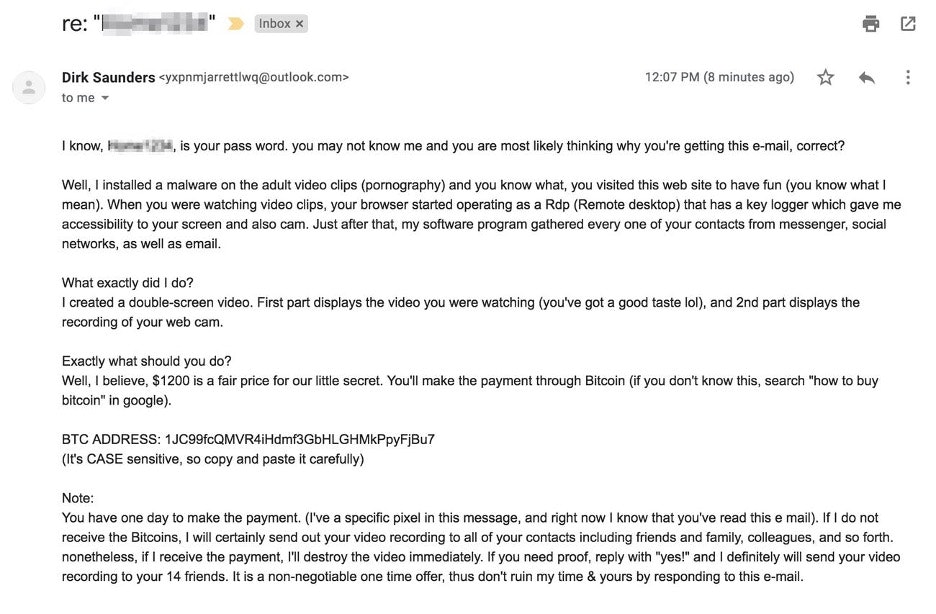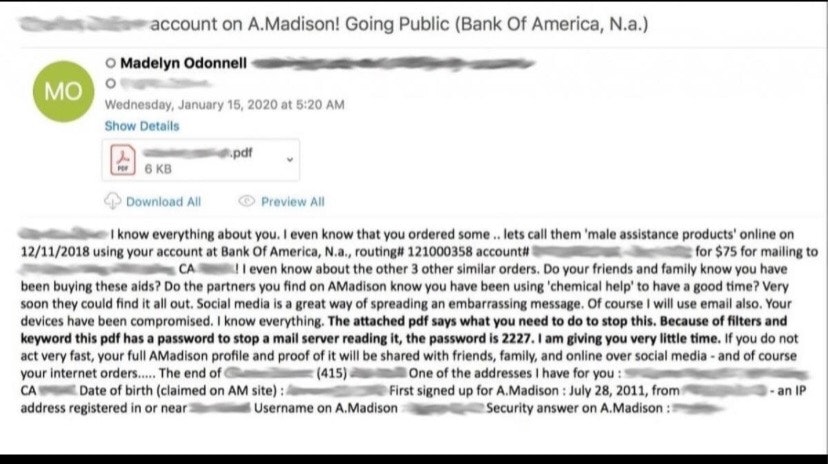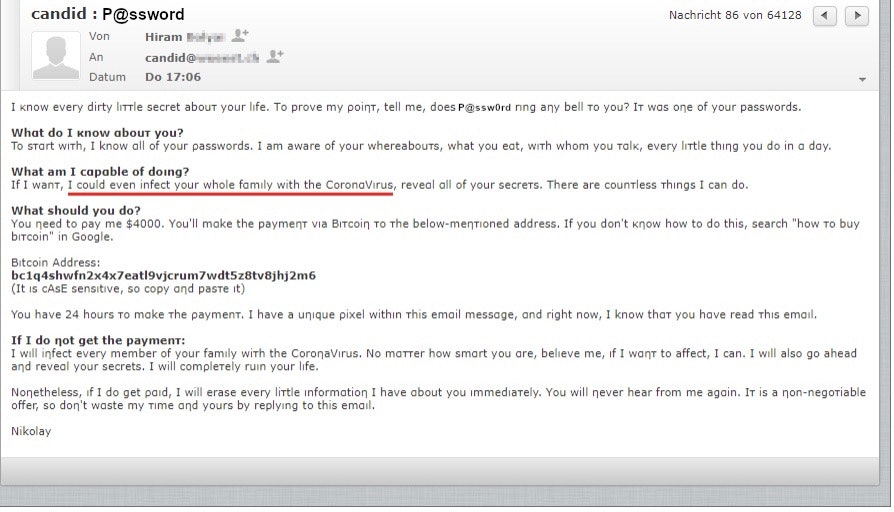- What Are Bitcoin Blackmail Emails?
- How to Protect Yourself From Bitcoin Blackmail Emails
- Examples of Bitcoin Blackmail Emails
- What to Do You Receive a Bitcoin Blackmail Email
- Frequently Asked Questions
Bitcoin blackmail emails can be difficult to beat since you can never be too sure if the scammer/hacker actually has your information or not. It's important that you keep your computers and devices secure and safe from hackers so you aren't targeted by these blackmailers.
What Are Bitcoin Blackmail Emails?
Receiving a threat via email is a frightening experience. Recently, scammers have taken this to a new level by sending emails to people that demand bitcoin payments in exchange for keeping quiet about embarrassing or sensitive information, photos, and videos. Here’s how bitcoin blackmail emails work.
You Receive an Email
The message states that you have been caught doing something embarrassing or incriminating. For example, the sender may claim to have hacked into your computer and recorded you visiting adult websites or found other sensitive videos, photos, or compromising information. As proof, they might disclose one of the passwords you may have used in the past. Then, they threaten to distribute the video to your entire contact list within hours unless you immediately send a payment to their bitcoin account.
In another form of the bitcoin scam email, the scammer claims they’ve breached your website and gained access to sensitive company data, medical files, or proof of criminal activity.
Many bitcoin blackmail emails involve the hacker threatening to post embarrassing footage of you visiting adult websites. This particular form of blackmail is known as sextortion.
You Make the Bitcoin Payment
The message scares you, so you make the payment using the instructions provided in the email. The amount tends to be several thousand dollars worth of bitcoin. The message promises that once the payment is received, they will drop the threat.
Your Money Is Gone, and You Remain Vulnerable
Once you click the link to send the payment, the scammer now has access to your financial information, leaving you vulnerable to identity theft. You likely won’t be able to recover the funds you sent. When you clicked the link, malware and viruses may have been installed on your computer.
How to Protect Yourself From Bitcoin Blackmail Emails
Scammers can target anyone in the bitcoin email scam, whether or not you’ve visited adult websites or shared explicit photos. Here’s how to avoid this scam:
- Don't respond to threatening emails: As terrifying as it may be to receive this kind of email, do not respond or engage with the sender. Instead, delete the bitcoin scam email immediately.
- Don't send money: Never send bitcoin that an unknown sender is demanding via email. Remember that the scammer is just trying to prey on your fear of public humiliation, and the threat is an empty one. Furthermore, if the scammer actually had access to any of your files, photos, or videos, they would have included a screenshot.
- Update your passwords often: It’s possible you received this email because your data was exposed during a data breach that occurred several years ago. That would explain why the scammer has access to your email address, password, or phone number (and might mention it in the email to boost their believability). Update your passwords frequently and use a password manager, so your passwords are always strong and unique.
- Turn on two-factor authentication (2FA) for all accounts: By turning on 2FA, when you try to log in to your accounts, you’ll have to verify your identity by clicking on an emailed link or typing in a code that’s texted to your mobile phone. Doing so is the best way to add extra security to your accounts and protect against hackers.
- Cover your webcam: When you’re not using your webcam, cover it with a piece of masking tape. This can provide an additional layer of security in case your webcam is ever compromised.
- Secure your private files: Even though these scammers have not actually accessed any of your private photos or videos, it’s essential to keep those files secure just in case. For peace of mind, keep them on an encrypted external hard drive.
Although all bitcoin transactions are traceable, the identity of bitcoin owners is hidden, which is why hackers request bitcoin instead of wire transfers or forms of payment.
Red Flags of Bitcoin Blackmail Email Scams
Bitcoin blackmail emails tend to show all the classic signs of a scam, which include:
- No specific details on the sensitive information the scammer claims to have are provided: The scammer offers only vague information but doesn’t provide the actual incriminating photos, videos, or files that they’re threatening to expose.
- A demand for urgent payment in bitcoin: The message will indicate that you’ve started a countdown by opening the email, giving you a window of time (such as three days) to comply with their instructions. You’ll be asked to make the payment in bitcoin.
- Spelling and grammatical errors.
- Scammers indicating they have your password due to a hack: You might see your password (or another sensitive and personal piece of information, such as your address or phone number) either in the subject line or the body of the message. The scammer typically will claim that they gained access to your password and the other sensitive information through a hack. The password, however, will likely be an older one that you might not even use anymore.
- The email appears to have been sent from your email address.
- The message stating your device has been compromised.
Examples of Bitcoin Blackmail Emails
Bitcoin scam emails tend to follow a similar script. For example, in the following email, the scammer details how he hacked into a victim’s computer to uncover “adult video clips” but doesn’t provide any evidence that those clips are actually in his possession. He also asks for $1,200 in bitcoin within one day.
In this example, the scammer mentions the victim’s bank account information, which may have been exposed in a data breach. This victim may have been targeted because his information was stolen in the 2015 data breach of Ashley Madison, a website known for enabling extramarital affairs.
The following email takes the scam a step further, with the scammer threatening to “infect your whole family with coronavirus” as well as reveal the victim’s secrets. The bitcoin payment is set at $4,000.
What to Do You Receive a Bitcoin Blackmail Email
It’s normal to feel scared and worried if you receive an email threatening to expose your personal information to your entire contact list. In 2020, the FBI received 76,741 reports of digital extortion, with a total loss of over $70 million to victims. Unfortunately, these scammers can be pretty convincing. If you do happen to send money to one of these scammers, here’s what you should do next.
It's important to verify links and contact details to beat imposters.
Report the Crime
As a victim of the bitcoin email scam, you should immediately report it to the FBI Internet Crime Complaint Center. You will need to provide:
- Your name, address, telephone, and email
- Financial transaction information (e.g., account information, transaction date and amount, who received the money)
- Subject’s name, address, telephone, email, website, and IP address
- The subject is the person/entity allegedly committing the Internet crime
- Specific details on how you were victimized
- Email header(s)
- Any other relevant information you believe is necessary to support your complaint
Since you have already paid the funds to the scammer, you should report the crime to your local police as well.
Change Passwords
Make sure you aren’t currently using the password that the scammer mentioned in the email. Chances are, the password the scammer mentioned was an old one, but check all of your online accounts and update the passwords to be on the safe side.
Scan Your Device
Guard against any possible malware that may have been installed on your computer. Run a scan of your computer or device using up-to-date antimalware.





Comments